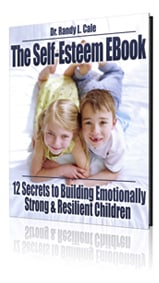Many questions get asked about how to help support a child’s evolving self-esteem. There are many pointers offered that involve mom and dad doing more, rather than doing less. In a way, this is misleading and only puts added demands upon parents for the rest of their lives, as apparently you are to ‘feed’ their fragile sense of esteem for the years to come. As you will see, this is not required, and is often destructive.
So, let’s begin by giving you a break, so you can relax a bit and allow your children the chance to learn.
Self-Esteem Secret One: Relax and Stop Working So Hard.
For many of you, you are constantly trying to keep things moving. You are correcting, prompting and pushing things along. This is hard work, and exhausting. I want to give you permission to relax and stop most of this. Now, you will need a system to get things done, but the incessant talking and commenting and coaching is NOT a system. That’s work.
Next, I want to give you a stronger reason why you must stop this. These parenting patterns will almost inevitably undermine a child’s sense of certainty and belief in themselves. They are destroyers of self-esteem, and include:
- Repetitive nagging, prompting, coaching and reminding
- Constant criticism, suggestions for doing it better
- Noticing what’s wrong rather than what’s right
- Rarely finding success and only noticing failure
- Parents whining, complaining & commenting on frustrations
- Parents selectively noticing what’s wrong in the world
- Parents feeding children’s negativity with their energy
- Parents arguing repeatedly with children
- The absence of simple acceptance
The list could get longer…but you get a sense of what I am talking about. Here’s the key piece to take away from this: There is a subtext, to the ongoing stream of feedback, reminding, prodding, pushing, complaints, and arguing.
The subtext, or unspoken message, is very powerfully heard by children with the constant repetition. And it is something like this: “You don’t get it, sweetheart…You don’t get it…You don’t get it.” (Otherwise, why would I keep repeating myself, if you were competent, capable and able to learn from experience.)
Can you sense the importance, and toxic power of the unrelenting coaching, teaching, and reminding? It is quite profound, and at the core of why children develop low-self-esteem, and the personality patterns (i.e., narcissistic, dependent, depressed, etc.) to hide this pain. The bottom line becomes quite simple: Mom…Dad…relax a bit. Stop. Stop all that nagging, reminding, arguing, and so forth. If you do, you will have taken the first major step to enhance your child’s esteem.
Self-Esteem Secret Two: You always have a choice!
We come at the world with one perspective or another: Either we have a choice about what we do…or we don’t have a choice. The more we stand in the position of ‘no choice’ then we become victims of our environment. We feel powerless and our sense of autonomy, self-control and self-esteem all suffer. The victim mentality is not far behind, and with this comes much misery.
On the other hand, what happens when we recognize that we (almost) always have a choice? What if your children could grow up with a sense that they always have a choice?
In this world, your children are always ‘at cause’ for happens next cause. Imagine what this does for their sense of esteem. They grow up feeling like you always have a choice where it matters, and you never feel boxed in. The more that we live in an internal world where we have a sense that ‘I always have a choice,’ the more that I feel in control and the more responsibility I end up taking for my action.
If, as an adult, we are caught in the victim mentality, you might be tempted to argue about the choice issue. And yet, reality suggests otherwise. So, let’s just check reality.
- We can choose to drive the speed limit or not.
- We can choose to show up at work on time or not.
- We can choose to fill up our tank or not.
- We can choose to be kind or nasty.
- We can choose to watch this program or another program.
- We can choose to change a habit today or not.
Notice that the list can be unlimited here. In each of these situations, we have choice. The sense of having control or choice is perhaps the single most important variable that impacts our trajectory of success and happiness over our lifetimes.
In next week’s article, we will review the two additional building blocks that will ensure your child’s self-esteem develops in a healthy and strong manner. For now, notice if you can simply master these two changes. And if your child’s esteem is suffering already, just remember that change takes time. Both for you…and for them. And have certainty: their confidence will get better as your strategy gets better.















